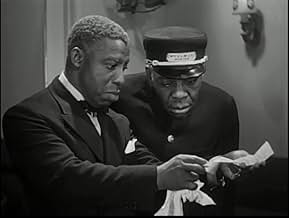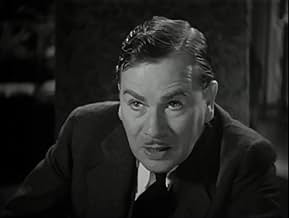Button Gwinett Brown is a freshman congressman on a mission to rid Washington of corruption. He quickly runs afoul of the powerful Senator Norton, while falling for the granddaughter of the ... Read allButton Gwinett Brown is a freshman congressman on a mission to rid Washington of corruption. He quickly runs afoul of the powerful Senator Norton, while falling for the granddaughter of the kindly senator Wylie. He then teams up with some members of the Bonus Army to foil the vil... Read allButton Gwinett Brown is a freshman congressman on a mission to rid Washington of corruption. He quickly runs afoul of the powerful Senator Norton, while falling for the granddaughter of the kindly senator Wylie. He then teams up with some members of the Bonus Army to foil the villains' plans.
- Director
- Writers
- Stars
- Awards
- 2 wins total
- Speaker
- (as Burton Churchill)
- Worker
- (uncredited)
- Worker
- (uncredited)
- Senate Clerk
- (uncredited)
- Erickson
- (uncredited)
- Carl Tilden
- (uncredited)
- Alice's Aunt
- (uncredited)
- Party Guest
- (uncredited)
- Martin - Wylie's Secretary
- (uncredited)
- Director
- Writers
- All cast & crew
- Production, box office & more at IMDbPro
Featured reviews
Here's another thoroughly pre-code movie, with Washington corruption rampant, Bonus Army marchers, suicide, and, alas, an ultimately naive view that all that is needed are a few convenient deaths to make freedom ring. Director James Cruze was on the point of becoming a back number, but he gets some fine performances here from Connolly, Dinehart, and Miss Cummings.
It's easy to see that Capra and his writers plundered this movie for MR. SMITH GOES TO WASHINGTON. Even though that movie must have caused Joe Breen to write some nasty letters, the corruption there is pretty obvious; even though the Lincoln Memorial scene is cut pretty short here -- we see Abe, and then he's gone -- that's another borrowing. But Tracy is wise to the ways of the world when we first meet him. It's how he's going to fight them that's the question. It will take more than Claude Raines failing to kill himself to do it.
Buttons Gwinett Brown (Lee Tracy) has just been elected to a house seat. He's the descendant of a hero of the American revolution, but unlike James Stewart's Mr. Smith, he is no babe in the woods. He knows he was elected by bought votes and via corruption, but he plans to double-cross the double-crossers and help stamp out corruption in Congress, and doesn't care if he's a one-termer. He says all of this when he visits the Bonus Army that is encamped outside of Washington - the WWI vets that are in a sit down strike demanding the bonus they were promised years ago.
Buttons may know what he wants to accomplish when he arrives in D.C., but he doesn't know how to accomplish it. I had my doubts about Lee Tracy playing a Washington reformer, but he was absolutely perfect in a role that requires absolute cynicism intertwined with patriotism. This thing is precode and frighteningly relevant to today's Washington with Tracy's Buttons Gwinett talking about all of the lobbyists attached to Congress and voter apathy allowing the system to go on. There are suicides, murder, bold faced bribes, a man who would be king -literally, and the only boy scouts in this film involve a troop briefly marching through a train station past a group of very self-satisfied women wearing banners saying "No Saloons" the year before Prohibition ends.
Constance Cummings is the closest thing to Jean Arthur's counterpart in Mr. Smith, but here she is a Mary Antoinette like granddaughter of a senior senator, all caught up in Washington society and appearances - at first, that is. Strangely enough Walter Connally is playing a very old man here, at only age 45.
I'd highly recommend this one. The end kind of leaves you hanging, but remember this was released when unemployment was 25% and before FDR. The nation was kind of hanging at that point too, not knowing what was going to happen next.
Don't believe Halliwell on this one ("naive comedy-drama with a miscast star"). Lee Tracy plays Button Gwinnet Brown (descended from a Declaration of Independence signer), elected by the crooked machine but determined to bite the hand that fed him. He's perfectly cast as the no-bull guy who (though he may be cynical at times) always tells the unpalatable truth. His several great "soap-box" speeches might have been unbearable from anyone else. His speech about how everyone has their hand out, delivered to bonus marchers who have their hands out, his complaint about pork-barrel bills, and his comments on voter apathy are all still timely. (The touch of vigilantism, though admirably held in check, and the suggestion of the danger of dictatorship, are mere whispers of thirties sensibilities.) This portrait of Washington's corrupt lobbyists and influence peddling seems, if anything, more relevant to today's scene than Capra's better-known tracts.
On the train to Washington he meets Constance Cummings, a Washington insider, who wants to put him on the inside track in spite of himself. She's not Capra's brassy tool of cynicism whose latent heart of gold is set beating by the hero's purity. Her attitude is more ambiguous; she seems to think Tracy's crusade against corruption can be waged without danger to the status quo. (One advantage of the brevity of the film is that it all takes place over a few days, so it's logical for her not to completely grasp his intent.) Cummings is one of the forgotten great female leads of the early thirties, largely because many of her films are unavailable Columbia films like this one. Her performance here and her character as written are exceptional.
Walter Connolly, as an honest but complaisant Senator, is excellent, as always. Alan Dinehart is a Washington wheel and all-around bad guy, quite believable.
Very enjoyable and well worth seeing; too bad this seems to be unavailable on TV and video.
'Washington Merry-Go-Round' was the title of a long-running newspaper feature by political columnist Drew Pearson (the mentor of Watergate era's Jack Anderson), and it's also the title of this film by underrated director James Cruze. Lee Tracy gives a fine performance in an atypical role: he's an honest, uncynical and naive man who has just been elected to the House of Representatives. He's immediately offered bribes by various political factions, but he turns them all down. Tracy's character is named Button Gwinnett Brown, and he's identified as a descendant of the (real-life) patriot Button Gwinnett. (Gwinnett was a member of the Continental Congress who signed the Declaration of Independence and then got killed in a duel less than a year later. His autograph is extremely valuable, being much rarer than George Washington's or Ben Franklin's. In this movie, the fictional Gwinnett owns a letter written by his ancestor; it's worth $50,000, but he carries it folded up in his wallet!)
The excellent actor Alan Dinehart is quite good as Ed Norton, a crooked lobbyist who wants Brown to vote for legislation which will help the Prohibition bootlegging trade. Dinehart has impressed me in nearly every role in which I've ever seen him, and he's at the top of his form here. Walter Connolly (an actor who never impressed me) plays a senator who is honest but stupid (come, now: how many of THOSE have we ever had?), unfortunately named Wylie. He's Wylie by name but not wily by nature. Wylie won't accept Norton's bribes, but the two men frequently play high-stakes poker. Norton deliberately loses one hand after another to Wylie, giving Wylie the money which would have been his bribe anyway. The stupidity of Wylie's character is rather far-fetched. (Connolly was never a very plausible actor.)
The power-hungry Norton praises Mussolini and Stalin, yet makes no mention of current (1932) events in Germany. Is it coincidence that Norton's poker chips have swastikas? Elsewhere, this Columbia film uses the same taxicab (Yellow Cab #79) that showed up in Universal's drama "Okay, America!".
The talented black actor Clarence Muse is saddled with another of the many 'yassuh!' roles that unfortunately constituted the bulk of his career. The photography by Ted Tetzlaff is blighted by poor shot-matching and some rear-projection that's more obvious than it needs to be. And a major plot point is never explained: how did so many Bonus Marchers manage to get jobs (in the Depression!) which enable them to spy on Norton? I'll rate 'Washington Merry-Go-Round' 6 points out of 10.
Did you know
- TriviaThe title is taken from a popular 1931 best selling book, "Washington Merry-Go-Round," by Robert Sharon Allen and Drew Pearson. Columbia bought the rights to the title only, and then hired Maxwell Anderson to write a fictionalized story about corruption in Washington, D.C..
- Quotes
Button Gwinett Brown: Let me tell you this: This nation is in trouble, great trouble, plagued with a thousand problems. This isn't just a depression; this is a crisis! You've got a Senate and a House of Representatives, filled mostly with honest, patriotic men. . . . And they're all striving to bring this nation back to its place in the sun. But they're handicapped--hamstrung by a hidden government--an evil, marauding crew that has turned the Constitution of the United States into a bill of sale.
- SoundtracksThe Star Spangled Banner
(1814) (uncredited)
Music by John Stafford Smith
In the score during the opening credits and at the end
Details
- Release date
- Country of origin
- Language
- Also known as
- Invisible Power
- Production company
- See more company credits at IMDbPro
- Runtime
- 1h 19m(79 min)
- Color
- Aspect ratio
- 1.37 : 1



































